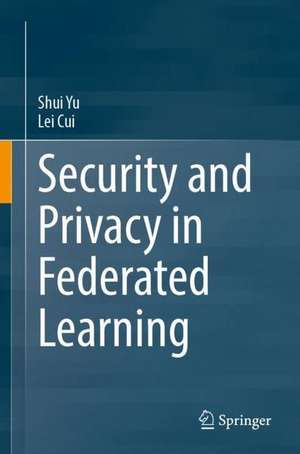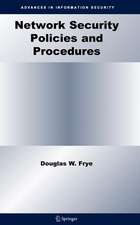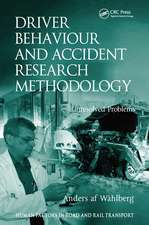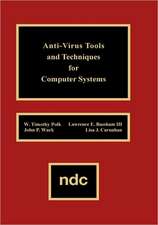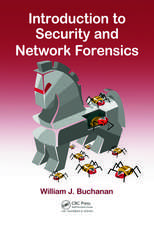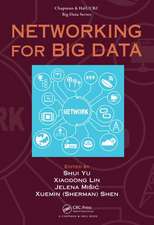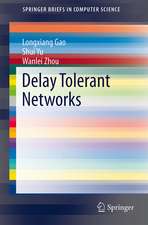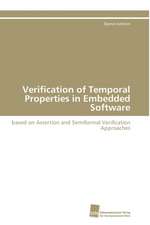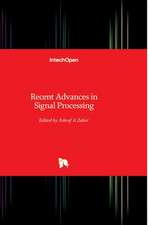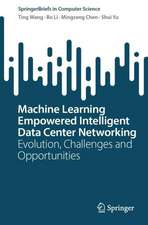Security and Privacy in Federated Learning: Digital Privacy and Security
Autor Shui Yu, Lei Cuien Limba Engleză Hardback – 11 mar 2023
The book offers an essential overview for researchers who are new to the field, while also equipping them to explore this “uncharted territory.” For each topic, the authors first present the key concepts, followed by the most important issues and solutions, with appropriate references for further reading.
The book is self-contained, and all chapters can be read independently. It offers a valuable resource for master’s students, upper undergraduates, Ph.D. students, and practicing engineers alike.
| Toate formatele și edițiile | Preț | Express |
|---|---|---|
| Paperback (1) | 919.26 lei 38-44 zile | |
| Springer Nature Singapore – 12 mar 2024 | 919.26 lei 38-44 zile | |
| Hardback (1) | 931.51 lei 38-44 zile | |
| Springer Nature Singapore – 11 mar 2023 | 931.51 lei 38-44 zile |
Preț: 931.51 lei
Preț vechi: 1164.39 lei
-20% Nou
Puncte Express: 1397
Preț estimativ în valută:
178.26€ • 193.57$ • 149.74£
178.26€ • 193.57$ • 149.74£
Carte tipărită la comandă
Livrare economică 18-24 aprilie
Preluare comenzi: 021 569.72.76
Specificații
ISBN-13: 9789811986918
ISBN-10: 9811986916
Pagini: 133
Ilustrații: XII, 133 p. 1 illus.
Dimensiuni: 155 x 235 mm
Greutate: 0.39 kg
Ediția:2023
Editura: Springer Nature Singapore
Colecția Springer
Seria Digital Privacy and Security
Locul publicării:Singapore, Singapore
ISBN-10: 9811986916
Pagini: 133
Ilustrații: XII, 133 p. 1 illus.
Dimensiuni: 155 x 235 mm
Greutate: 0.39 kg
Ediția:2023
Editura: Springer Nature Singapore
Colecția Springer
Seria Digital Privacy and Security
Locul publicării:Singapore, Singapore
Cuprins
Chapter 1. Introduction of Federated Learning.- Chapter 2. Inference Attacks and Counter Attacks in Federated Learning.- Chapter 3. Poisoning Attacks and Counter Attacks in Federated Learning.- Chapter 4. GAN Attacks and Counter Attacks in Federated Learning.- Chapter 5. Differential Privacy in Federated Learning.- Chapter 6. Secure Multi-Party Computation in Federated Learning.- Chapter 7. Secure Data Aggregation in Federated Learning.- Chapter 8. Anonymous Communication and Shuffle Model in Federated Learning.- Chapter 9. The Future Work.
Notă biografică
Shui Yu obtained his PhD from Deakin University, Australia, in 2004. He currently is a Professor of School of Computer Science, University of Technology Sydney, Australia. Dr Yu’s research interest includes Big Data, Security and Privacy, Networking, and Mathematical Modelling. He has published four monographs and edited two books, more than 500 technical papers, including top journals and top conferences, such as IEEE TPDS, TC, TIFS, TMC, TKDE, TETC, ToN, and INFOCOM. His h-index is 66. Dr Yu initiated the research field of networking for big data in 2013, and his research outputs have been widely adopted by industrial systems, such as Amazon cloud security. He is currently serving a number of prestigious editorial boards, including IEEE Communications Surveys and Tutorials (Area Editor), IEEE Communications Magazine, IEEE Internet of Things Journal, and so on. He served as a Distinguished Lecturer of IEEE Communications Society (2018-2021). He is a Distinguished Visitor ofIEEE Computer Society, a voting member of IEEE ComSoc Educational Services board, and an elected member of Board of Governor of IEEE Vehicular Technology Society.
Lei Cui received his PhD degree from Deakin University, Australia, in 2021. He is now working as an associate research fellow at Shandong Computer Science Center (National Supercomputer Center in Jinan), China. He has authored or co-authored more than 30 publications, including monographs, book chapters, and journal and conference papers. Some of his publications have been published in top venues such as IEEE TII, IEEE TNSM, and IEEE TPDS. His research interests include security and privacy issues in IoT, social networks, and machine learning. Dr. Lei is active in the communication society and has served as a reviewer for many Q1 journals and a TPC Member for international conferences.
Lei Cui received his PhD degree from Deakin University, Australia, in 2021. He is now working as an associate research fellow at Shandong Computer Science Center (National Supercomputer Center in Jinan), China. He has authored or co-authored more than 30 publications, including monographs, book chapters, and journal and conference papers. Some of his publications have been published in top venues such as IEEE TII, IEEE TNSM, and IEEE TPDS. His research interests include security and privacy issues in IoT, social networks, and machine learning. Dr. Lei is active in the communication society and has served as a reviewer for many Q1 journals and a TPC Member for international conferences.
Textul de pe ultima copertă
In this book, the authors highlight the latest research findings on the security and privacy of federated learning systems. The main attacks and counterattacks in this booming field are presented to readers in connection with inference, poisoning, generative adversarial networks, differential privacy, secure multi-party computation, homomorphic encryption, and shuffle, respectively.
The book offers an essential overview for researchers who are new to the field, while also equipping them to explore this “uncharted territory.” For each topic, the authors first present the key concepts, followed by the most important issues and solutions, with appropriate references for further reading.
The book is self-contained, and all chapters can be read independently. It offers a valuable resource for master’s students, upper undergraduates, Ph.D. students, and practicing engineers alike.
The book offers an essential overview for researchers who are new to the field, while also equipping them to explore this “uncharted territory.” For each topic, the authors first present the key concepts, followed by the most important issues and solutions, with appropriate references for further reading.
The book is self-contained, and all chapters can be read independently. It offers a valuable resource for master’s students, upper undergraduates, Ph.D. students, and practicing engineers alike.
Caracteristici
Focuses on security and privacy in federated learning for research purposes Integrates the latest research results findings in the field Offers insightful comments and concrete guidance
